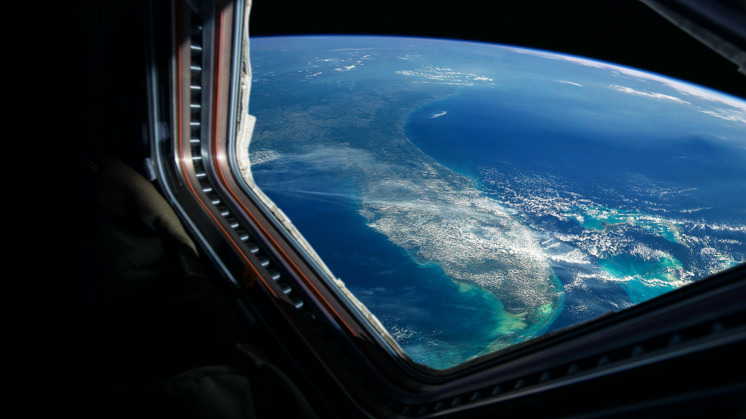Space Tourism
Space tourism is taking off: how will it develop over the coming decades?
On 20 July 2021, Jeff Bezos, founder and CEO of Amazon, took off into space on board the New Shepard. Just days earlier, Richard Branson, founder of Virgin Group, achieved the milestone that is paving the way for space tourism, albeit only for multimillionaires. Let's travel into the past to learn about history's earliest examples of space tourism, and then look to the future to glimpse what might be on the horizon for this booming industry.

Endless people, not just thinkers, writers and scientists, have imagined themselves travelling into space at some time or other. And then, at last, it happened, thanks to humankind's determination to explore. Up until now, only fortunate astronauts have been able to travel to outer space and observe the Earth from a new perspective. But all that may change within the next few years with the growing popularity of space tourism, which started in 2021 when several milestones were achieved and continues to advance and improve over the years.
Conquest of space
Humans started to realise their ambitions to conquer space back in 1961 when Russian cosmonaut Yuri Gagarin became the first human to orbit the Earth on an adventure that lasted 108 minutes. He was followed by others, among them his countrywoman Valentina Tereshkova (1963) who became the first woman to fly to outer space aboard the Vostok 6; and US astronauts like Michael Collins, Edwin Aldrich and Neil Armstrong (1969), who succeeded in stepping on the surface of the Moon, still the biggest achievement of the space race.
After that, the pace slowed somewhat and it was not until 1986 when a new landmark event would occur: the launch into orbit of the MIR space station, which was visited by more than 100 astronauts up to 2001. After MIR came the International Space Station (ISS), which went into orbit in 1998. A total of 16 countries took part in its construction.
There have also been more than 300 unmanned space missions. Among the most famous are the Cassini-Huygens mission to Saturn, Messenger which went to Mercury and the Perseverance mission to Mars. The latter is the best known because the Mars landing was broadcast live around the world in February 2021. Samples gathered so far by the Perseverence rover support the idea that there was once some kind of liquid water on the Red Planet.
Space travel for tourists
Although there were scientists rather than tourists on the above voyages to space, they have still encouraged people to dream about the potential for space tourism.
First space tourist
In 2011, American multimillionaire Denis Tito paid Roscosmos, the Russian space agency, $20 million for a trip to outer space. Aeronautical engineer Tito, who was not an astronaut, spent his 60th birthday there and made the dream of his youth come true for almost a week on the International Space Station, becoming the first space tourist in history. On his return to Earth, he said it was: "the best experience of my life".
In subsequent years, other tourists would follow Tito: Mark Shuttleworth, Charles Simonyi, who repeated the experience, and Guy Laliberté, etc. All these multimillionaires paid between $20 and $40 million for a brief trip to space. The Iranian-American Anousheh Ansari, who spent around ten days in orbit in 2006 and became the first female space tourist, is also worth mentioning.
Jeff Bezos in space
Space tourism has received a massive boost in 2021 from three multimillionaires: Elon Musk, Jeff Bezos and Richard Branson. Let's take a look at what each of them did:
The three visionaries of space tourism
Although space tourism is a luxury within the reach of very few, it is starting to take off thanks to the efforts of three entrepreneurs with a proven track record in business.
100 KM above sea level

- Company
- Virgin Galactic
- Mission
- Unity 22 (11 July 2021)
- Flight type
- Suborbital with pilot
- Flight time
- 90 minutes
- Altitude
- 86 km
- Speed
- 3,675 km/h
- Crew
- Six people (Richard Branson, Sirisha Brandla, Colin Bennet, Beth Moses, Dave Mackay and Michael Masucci)
- Price per flight
- $250,000
- Company
- Blue Origin
- Mission
- NS-16 (20 July 2021)
- Flight type
- Autonomous suborbital
- Flight time
- 10 minutes
- Altitude
- 106 km
- Speed
- 3,595 km/h
- Crew
- 4 people (Jeff Bezos, Mark Bezos, Wally Funk y Oliver Daemen)
- Price per flight
- $28 M by auction
- Company
- SpaceX
- Mission
- Polaris Dawn (10 Sept. 2021)
- Flight time
- Orbital
- Tiempo de vuelo
- 5 days
- Altitude
- Between 190 and 740 km
- Speed
- 27,358 km/h
- Crew
- 4 people (Jared Isaacman, Scott Poteet, Sarah Gillis y Ana Menon)
- Price per flight
- Not disclosed

Source: Blue Origin, SpaceX, Virgin Galactic, CNBC, Yahoo, CNN.
SEE INFOGRAPHIC: The three visionaries of space tourism [PDF] External link, opens in new window.
The future of space tourism
Suborbital flights, orbital flights and, naturally, trips to the Moon and beyond. Space tourism has a future, even more so if multimillionaires continue to invest in the sector. In fact, in 2023, Global Market Insights published a report which calculated that this industry may be worth $129 B by 2032.
For the space tourism business to succeed, say the experts, aspects other than technical matters will have to be considered, such as the legal and environmental implications. For example, when it comes to the latter, many are speaking out against the pollution that this industry might produce as it develops at a time when we are in the throes of climate change. That is why a means of making this type of travel sustainable must be found: Jeff Bezos' flight with Blue Origin used hydrogen and liquid oxygen, which are fuels with a lower environmental footprint.
How much does a trip to space cost
If we have managed to stimulate your imagination and you can already see yourself on board a spaceship, remember that these flights are incredibly expensive and it will be a long time until they become affordable. In fact, the cheapest ticket costs around 400,000 dollars with Virgin Galactic, which is seriously less expensive than the $28 M it costs to ride on Blue Origin or the $50 M that it will set you back to fly on Space X. Unless you have this kind of money, all you can do at the moment is to get your body and mind in tip-top condition, because flights of this kind are enormously demanding.
Other emerging companies, such as World View, offer you trips to the stratosphere for $50,000. Although it does not reach outer space, it allows you to experience gravity and gain a unique view of the Earth.
Above Space has already started planning the construction of its space hotels for tourist accommodations. Although development is at the very early stages still, it is a step closer to normalising space tourism.

Spatial Computing
Spatial computing seeks to change the paradigm so that machines are able to interpret the real world.

The self-driving car
The self-driving car developed by Google doesn't need the Internet to travel safely on the road.

Educational robots
Find out how robots can help your children's education and which are the most popular.

Genetic modification
Cutting and pasting genes is the basis of CRISPR, we explain what this technology is and what it is used for.







